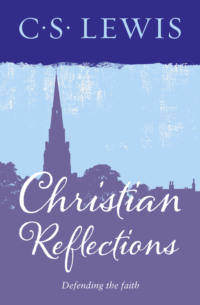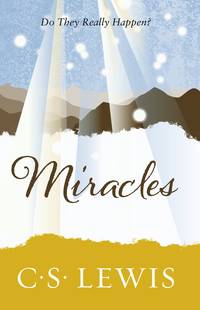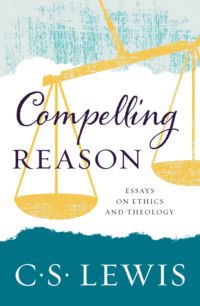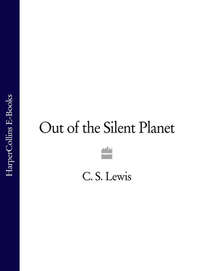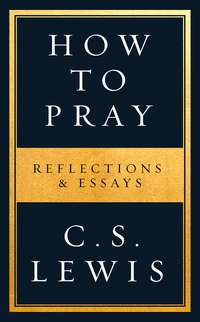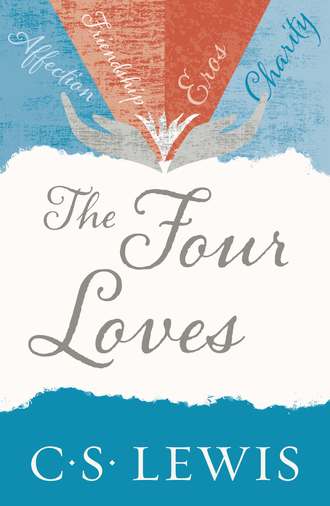
Полная версия
The Four Loves
What Appreciative pleasure foreshadows is not so quickly described.
First of all, it is the starting point for our whole experience of beauty. It is impossible to draw a line below which such pleasures are ‘sensual’ and above which they are ‘aesthetic’. The experiences of the expert in claret already contain elements of concentration, judgment and disciplined perceptiveness, which are not sensual; those of the musician still contain elements which are. There is no frontier – there is seamless continuity – between the sensuous pleasure of garden smells and an enjoyment of the countryside (or ‘beauty’) as a whole, or even our enjoyment of the painters and poets who treat it.
And, as we have seen, there is in these pleasures from the very beginning a shadow or dawn of, or an invitation to, disinterestedness. Of course in one way we can be disinterested or unselfish, and far more heroically so, about the Need-pleasures: it is a cup of water that the wounded Sidney sacrifices to the dying soldier. But that is not the sort of disinterestedness I now mean. Sidney loves his neighbour. But in the Appreciative pleasures, even at their lowest, and more and more as they grow up into the full appreciation of all beauty, we get something that we can hardly help calling love and hardly help calling disinterested, towards the object itself. It is the feeling which would make a man unwilling to deface a great picture even if he were the last man left alive and himself about to die; which makes us glad of unspoiled forests that we shall never see; which makes us anxious that the garden or bean-field should continue to exist. We do not merely like the things; we pronounce them, in a momentarily God-like sense, ‘very good’.
And now our principle of starting at the lowest – without which ‘the highest does not stand’ – begins to pay a dividend. It has revealed to me a deficiency in our previous classification of the loves into those of Need and those of Gift. There is a third element in love, no less important than these, which is foreshadowed by our Appreciative pleasures. This judgment that the object is very good, this attention (almost homage) offered to it as a kind of debt, this wish that it should be and should continue being what it is even if we were never to enjoy it, can go out not only to things but to persons. When it is offered to a woman we call it admiration; when to a man, hero-worship; when to God, worship simply.
Need-love cries to God from our poverty; Gift-love longs to serve, or even to suffer for, God; Appreciative love says: ‘We give thanks to thee for thy great glory.’ Need-love says of a woman ‘I cannot live without her’; Gift-love longs to give her happiness, comfort, protection – if possible, wealth; Appreciative love gazes and holds its breath and is silent, rejoices that such a wonder should exist even if not for him, will not be wholly dejected by losing her, would rather have it so than never to have seen her at all.
We murder to dissect. In actual life, thank God, the three elements of love mix and succeed one another, moment by moment. Perhaps none of them except Need-love ever exists alone, in ‘chemical’ purity, for more than a few seconds. And perhaps that is because nothing about us except our neediness is, in this life, permanent.
Two forms of love for what is not personal demand special treatment.
For some people, perhaps especially for Englishmen and Russians, what we call ‘the love of nature’ is a permanent and serious sentiment. I mean here that love of nature which cannot be adequately classified simply as an instance of our love for beauty. Of course many natural objects – trees, flowers and animals – are beautiful. But the nature-lovers whom I have in mind are not very much concerned with individual beautiful objects of that sort. The man who is distracts them. An enthusiastic botanist is for them a dreadful companion on a ramble. He is always stopping to draw their attention to particulars. Nor are they looking for ‘views’ or landscapes. Wordsworth, their spokesman, strongly deprecates this. It leads to ‘a comparison of scene with scene’, makes you ‘pamper’ yourself with ‘meagre novelties of colour and proportion’. While you are busying yourself with this critical and discriminating activity you lose what really matters – the ‘moods of time and season’, the ‘spirit’ of the place. And of course Wordsworth is right. That is why, if you love nature in his fashion, a landscape painter is (out of doors) an even worse companion than a botanist.
It is the ‘moods’ or the ‘spirit’ that matter. Nature-lovers want to receive as fully as possible whatever nature, at each particular time and place, is, so to speak, saying. The obvious richness, grace and harmony of some scenes are no more precious to them than the grimness, bleakness, terror, monotony, or ‘visionary dreariness’ of others. The featureless itself gets from them a willing response. It is one more word uttered by nature. They lay themselves bare to the sheer quality of every countryside every hour of the day. They want to absorb it into themselves, to be coloured through and through by it.
This experience, like so many others, after being lauded to the skies in the nineteenth century, has been debunked by the moderns. And one must certainly concede to the debunkers that Wordsworth, not when he was communicating it as a poet, but when he was merely talking about it as a philosopher (or philosophaster), said some very silly things. It is silly, unless you have found any evidence, to believe that flowers enjoy the air they breathe, and sillier not to add that, if this were true, flowers would undoubtedly have pains as well as pleasures. Nor have many people been taught moral philosophy by an ‘impulse from a vernal wood’.
If they were, it would not necessarily be the sort of moral philosophy Wordsworth would have approved. It might be that of ruthless competition. For some moderns I think it is. They love nature in so far as, for them, she calls to ‘the dark gods in the blood’; not although, but because, sex and hunger and sheer power there operate without pity or shame.
If you take nature as a teacher she will teach you exactly the lessons you had already decided to learn; this is only another way of saying that nature does not teach. The tendency to take her as a teacher is obviously very easily grafted on to the experience we call ‘love of nature’. But it is only a graft. While we are actually subjected to them, the ‘moods’ and ‘spirits’ of nature point no morals. Overwhelming gaiety, insupportable grandeur, sombre desolation are flung at you. Make what you can of them, if you must make at all. The only imperative that nature utters is, ‘Look. Listen. Attend.’
The fact that this imperative is so often misinterpreted and sets people making theologies and pantheologies and antitheologies – all of which can be debunked – does not really touch the central experience itself. What nature-lovers – whether they are Wordsworthians or people with ‘dark gods in their blood’ – get from nature is an iconography, a language of images. I do not mean simply visual images; it is the ‘moods’ or ‘spirits’ themselves – the powerful expositions of terror, gloom, jocundity, cruelty, lust, innocence, purity – that are the images. In them each man can clothe his own belief. We must learn our theology or philosophy elsewhere (not surprisingly, we often learn them from theologians and philosophers).
But when I speak of ‘clothing’ our belief in such images I do not mean anything like using nature for similes or metaphors in the manner of the poets. Indeed I might have said ‘filling’ or ‘incarnating’ rather than clothing. Many people – I am one myself – would never, but for what nature does to us, have had any content to put into the words we must use in confessing our faith. Nature never taught me that there exists a God of glory and of infinite majesty. I had to learn that in other ways. But nature gave the word glory a meaning for me. I still do not know where else I could have found one. I do not see how the ‘fear’ of God could have ever meant to me anything but the lowest prudential efforts to be safe, if I had never seen certain ominous ravines and unapproachable crags. And if nature had never awakened certain longings in me, huge areas of what I can now mean by the ‘love’ of God would never, so far as I can see, have existed.
Of course the fact that a Christian can so use nature is not even the beginning of a proof that Christianity is true. Those suffering from Dark Gods can equally use her (I suppose) for their creed. That is precisely the point. Nature does not teach. A true philosophy may sometimes validate an experience of nature; an experience of nature cannot validate a philosophy. Nature will not verify any theological or metaphysical proposition (or not in the manner we are now considering); she will help to show what it means.
And not, on the Christian premises, by accident. The created glory may be expected to give us hints of the uncreated; for the one is derived from the other and in some fashion reflects it.
In some fashion. But not perhaps in so direct and simple a fashion as we at first might suppose. For of course all the facts stressed by nature-lovers of the other school are facts too; there are worms in the belly as well as primroses in the wood. Try to reconcile them, or to show that they don’t really need reconciliation, and you are turning from direct experience of nature – our present subject – to metaphysics or theodicy or something of that sort. That may be a sensible thing to do; but I think it should be kept distinct from the love of nature. While we are on that level, while we are still claiming to speak of what nature has directly ‘said’ to us, we must stick to it. We have seen an image of glory. We must not try to find a direct path through it and beyond it to an increasing knowledge of God. The path peters out almost at once. Terrors and mysteries, the whole depth of God’s counsels and the whole tangle of the history of the universe, choke it. We can’t get through; not that way. We must make a détour – leave the hills and woods and go back to our studies, to church, to our Bibles, to our knees. Otherwise the love of nature is beginning to turn into a nature religion. And then, even if it does not lead us to the Dark Gods, it will lead us to a great deal of nonsense.
But we need not surrender the love of nature — chastened and limited as I have suggested – to the debunkers. Nature cannot satisfy the desires she arouses nor answer theological questions nor sanctify us. Our real journey to God involves constantly turning our backs on her; passing from the dawn-lit fields into some poky little church, or (it might be) going to work in an East End parish. But the love of her has been a valuable and, for some people, an indispensable initiation.
I need not say ‘has been’. For in fact those who allow no more than this to the love of nature seem to be those who retain it. This is what one should expect. This love, when it sets up as a religion, is beginning to be a god – therefore to be a demon. And demons never keep their promises. Nature ‘dies on’ those who try to live for a love of nature. Coleridge ended by being insensible to her; Wordsworth, by lamenting that the glory had passed away. Say your prayers in a garden early, ignoring steadfastly the dew, the birds and the flowers, and you will come away overwhelmed by its freshness and joy; go there in order to be overwhelmed and, after a certain age, nine times out of ten nothing will happen to you.
I turn now to the love of one’s country. Here there is no need to labour M. de Rougemont’s maxim; we all know now that this love becomes a demon when it becomes a god. Some begin to suspect that it is never anything but a demon. But then they have to reject half the high poetry and half the heroic action our race has achieved. We cannot keep even Christ’s lament over Jerusalem. He too exhibits love for His country.
Let us limit our field. There is no need here for an essay on international ethics. When this love becomes demoniac it will of course produce wicked acts. But others, more skilled, may say what acts between nations are wicked. We are only considering the sentiment itself in the hope of being able to distinguish its innocent from its demoniac condition. Neither of these is the efficient cause of national behaviour. For strictly speaking it is rulers, not nations, who behave internationally. Demoniac patriotism in their subjects – I write only for subjects – will make it easier for them to act wickedly; healthy patriotism may make it harder: when they are wicked they may by propaganda encourage a demoniac condition of our sentiments in order to secure our acquiescence in their wickedness. If they are good, they could do the opposite. That is one reason why we private persons should keep a wary eye on the health or disease of our own love for our country. And that is what I am writing about.
How ambivalent patriotism is may be gauged by the fact that no two writers have expressed it more vigorously than Kipling and Chesterton. If it were one element two such men could not both have praised it. In reality it contains many ingredients, of which many different blends are possible.
First, there is love of home, of the place we grew up in or the places, perhaps many, which have been our homes; and of all places fairly near these and fairly like them; love of old acquaintances, of familiar sights, sounds and smells. Note that at its largest this is, for us, a love of England, Wales, Scotland, or Ulster. Only foreigners and politicians talk about ‘Britain’. Kipling’s ‘I do not love my empire’s foes’ strikes a ludicrously false note. My empire! With this love for the place there goes a love for the way of life; for beer and tea and open fires, trains with compartments in them and an unarmed police force and all the rest of it; for the local dialect and (a shade less) for our native language. As Chesterton says, a man’s reasons for not wanting his country to be ruled by foreigners are very like his reasons for not wanting his house to be burned down; because he ‘could not even begin’ to enumerate all the things he would miss.
It would be hard to find any legitimate point of view from which this feeling could be condemned. As the family offers us the first step beyond self-love, so this offers us the first step beyond family selfishness. Of course it is not pure charity; it involves love of our neighbours in the local, not of our Neighbour, in the Dominical, sense. But those who do not love the fellow-villagers or fellow-townsmen whom they have seen are not likely to have got very far towards loving ‘Man’ whom they have not. All natural affections, including this, can become rivals to spiritual love: but they can also be preparatory imitations of it, training (so to speak) of the spiritual muscles which Grace may later put to a higher service; as women nurse dolls in childhood and later nurse children. There may come an occasion for renouncing this love; pluck out your right eye. But you need to have an eye first: a creature which had none – which had only got so far as a ‘photosensitive’ spot – would be very ill employed in meditation on that severe text.
Of course patriotism of this kind is not in the least aggressive. It asks only to be let alone. It becomes militant only to protect what it loves. In any mind which has a pennyworth of imagination it produces a good attitude towards foreigners. How can I love my home without coming to realise that other men, no less rightly, love theirs? Once you have realised that the Frenchmen like café complet just as we like bacon and eggs – why, good luck to them and let them have it. The last thing we want is to make everywhere else just like our own home. It would not be home unless it were different.
The second ingredient is a particular attitude to our country’s past. I mean to that past as it lives in popular imagination; the great deeds of our ancestors. Remember Marathon. Remember Waterloo. ‘We must be free or die who speak the tongue that Shakespeare spoke.’ This past is felt both to impose an obligation and to hold out an assurance; we must not fall below the standards our fathers set us, and because we are their sons there is good hope we shall not.
This feeling has not quite such good credentials as the sheer love of home. The actual history of every country is full of shabby and even shameful doings. The heroic stories, if taken to be typical, give a false impression of it and are often themselves open to serious historical criticism. Hence a patriotism based on our glorious past is fair game for the debunker. As knowledge increases it may snap and be converted into disillusioned cynicism, or may be maintained by a voluntary shutting of the eyes. But who can condemn what clearly makes many people, at many important moments, behave so much better than they could have done without its help?
I think it is possible to be strengthened by the image of the past without being either deceived or puffed up. The image becomes dangerous in the precise degree to which it is mistaken, or substituted, for serious and systematic historical study. The stories are best when they are handed on and accepted as stories. I do not mean by this that they should be handed on as mere fictions (some of them are after all true). But the emphasis should be on the tale as such, on the picture which fires the imagination, the example that strengthens the will. The schoolboy who hears them should dimly feel – though of course he cannot put it into words – that he is hearing saga. Let him be thrilled – preferably ‘out of school’ – by the ‘Deeds that won the Empire’; but the less we mix this up with his ‘history lessons’ or mistake it for a serious analysis – worse still, a justification – of imperial policy, the better. When I was a child I had a book full of coloured pictures called Our Island Story. That title has always seemed to me to strike exactly the right note. The book did not look at all like a text-book either. What does seem to me poisonous, what breeds a type of patriotism that is pernicious if it lasts but not likely to last long in an educated adult, is the perfectly serious indoctrination of the young in knowably false or biased history – the heroic legend drably disguised as textbook fact. With this creeps in the tacit assumption that other nations have not equally their heroes; perhaps even the belief – surely it is very bad biology – that we can literally ‘inherit’ a tradition. And these almost inevitably lead on to a third thing that is sometimes called patriotism.
This third thing is not a sentiment but a belief; a firm, even prosaic belief that our own nation, in sober fact, has long been, and still is markedly superior to all others. I once ventured to say to an old clergyman who was voicing this sort of patriotism, ‘But, sir, aren’t we told that every people thinks its own men the bravest and its own women the fairest in the world?’ He replied with total gravity – he could not have been graver if he had been saying the Creed at the altar – ‘Yes, but in England it’s true.’ To be sure, this conviction had not made my friend (God rest his soul) a villain; only an extremely lovable old ass. It can however produce asses that kick and bite. On the lunatic fringe it may shade off into that popular Racialism which Christianity and science equally forbid.
This brings us to the fourth ingredient. If our nation is really so much better than others it may be held to have either the duties or the rights of a superior being towards them. In the nineteenth century the English became very conscious of such duties: the ‘white man’s burden’. What we called natives were our wards and we their self-appointed guardians. This was not all hypocrisy. We did do them some good. But our habit of talking as if England’s motive for acquiring an empire (or any youngster’s motives for seeking a job in the Indian Civil Service) had been mainly altruistic nauseated the world. And yet this showed the sense of superiority working at its best. Some nations who have also felt it have stressed the rights not the duties. To them, some foreigners were so bad that one had the right to exterminate them. Others, fitted only to be hewers of wood and drawers of water to the chosen people, had better be made to get on with their hewing and drawing. ‘Dogs, know your betters.’ I am far from suggesting that the two attitudes are on the same level. But both are fatal. Both demand that the area in which they operate should grow ‘wider still and wider’. And both have about them this sure mark of evil: only by being terrible do they avoid being comic. If there were no broken treaties with Redskins, no extermination of the Tasmanians, no gas-chambers and no Belsen, no Amritsar, Black and Tans or Apartheid, the pomposity of both would be roaring farce.
Finally we reach the stage where patriotism in its demoniac form unconsciously denies itself. Chesterton picked on two lines from Kipling as the perfect example. It was unfair to Kipling, who knew – wonderfully, for so homeless a man – what the love of home can mean. But the lines, in isolation, can be taken to sum up the thing. They run:
If England was what England seems ‘Ow quick we’d drop ‘er. But she ain’t!
Love never spoke that way. It is like loving your children only ‘if they’re good’, your wife only while she keeps her looks, your husband only so long as he is famous and successful. ‘No man,’ said one of the Greeks, ‘loves his city because it is great, but because it is his.’ A man who really loves his country will love her in her ruin and degeneration – ‘England, with all thy faults, I love thee still.’ She will be to him ‘a poor thing but mine own’. He may think her good and great, when she is not, because he loves her; the delusion is up to a point pardonable. But Kipling’s soldier reverses it; he loves her because he thinks her good and great – loves her on her merits. She is a fine going concern and it gratifies his pride to be in it. How if she ceased to be such? The answer is plainly given: ‘’Ow quick we’d drop ‘er.’ When the ship begins to sink he will leave her. Thus that kind of patriotism which sets off with the greatest swagger of drums and banners actually sets off on the road that can lead to Vichy. And this is a phenomenon which will meet us again. When the natural loves become lawless they do not merely do harm to other loves; they themselves cease to be the loves they were – to be loves at all.
Patriotism has then, many faces. Those who would reject it entirely do not seem to have considered what will certainly step – has already begun to step – into its place. For a long time yet, or perhaps forever, nations will live in danger. Rulers must somehow nerve their subjects to defend them or at least to prepare for their defence. Where the sentiment of patriotism has been destroyed this can be done only by presenting every international conflict in a purely ethical light. If people will spend neither sweat nor blood for ‘their country’ they must be made to feel that they are spending them for justice, or civilisation, or humanity. This is a step down, not up. Patriotic sentiment did not of course need to disregard ethics. Good men needed to be convinced that their country’s cause was just; but it was still their country’s cause, not the cause of justice as such. The difference seems to me important. I may without self-righteousness or hypocrisy think it just to defend my house by force against a burglar; but if I start pretending that I blacked his eye purely on moral grounds – wholly indifferent to the fact that the house in question was mine – I become insufferable. The pretence that when England’s cause is just we are on England’s side – as some neutral Don Quixote might be – for that reason alone, is equally spurious. And nonsense draws evil after it. If our country’s cause is the cause of God, wars must be wars of annihilation. A false transcendence is given to things which are very much of this world.
The glory of the old sentiment was that while it could steel men to the utmost endeavour, it still knew itself to be a sentiment. Wars could be heroic without pretending to be Holy Wars. The hero’s death was not confused with the martyr’s. And (delightfully) the same sentiment which could be so serious in a rearguard action, could also in peacetime, take itself as lightly as all happy loves often do. It could laugh at itself. Our older patriotic songs cannot be sung without a twinkle in the eye; later ones sound more like hymns. Give me ‘The British Grenadiers’ (with a tow-row-row-row) any day rather than ‘Land of Hope and Glory’.





